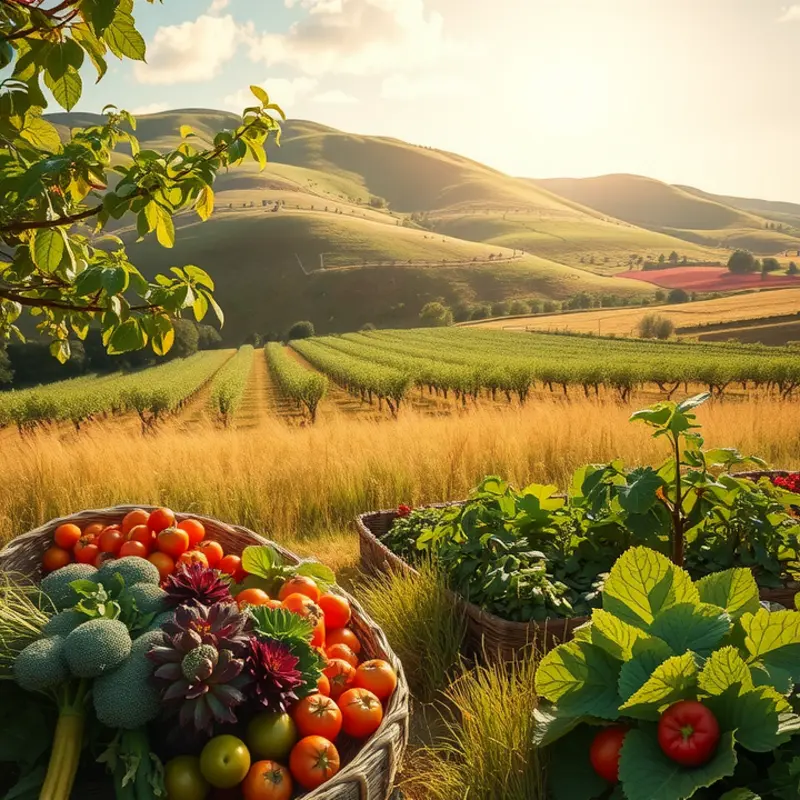Embracing planet-friendly cooking means making conscious choices in the kitchen that benefit both our health and the environment. By focusing on sustainable, local ingredients, reducing waste, and adopting eco-friendly cooking methods, you can play a vital role in combating climate change and promoting biodiversity. This guide provides practical steps and tips to help you create delicious meals that are kind to our planet, paving the way for a greener future.
Choosing Sustainable Ingredients: A Recipe for Change

The choices we make in the kitchen hold the potential to contribute significantly to planetary health. By opting for sustainable ingredients, we can align everyday cooking practices with environmental stewardship. Emphasizing local sourcing, seasonal produce, and organic farming underscores these efforts.
Local sourcing is an impactful step towards sustainability. Ingredients sourced nearby reduce the carbon footprint associated with transportation. They also support local economies and often result in fresher, more nutrient-rich produce. Consider visiting farmers’ markets or connecting with community-supported agriculture (CSA) programs to discover local options. When buying meat, eggs, or dairy, looking for producers who prioritize pasture-raised and free-range practices can make a substantial environmental difference.
Seasonal produce is another cornerstone of sustainable cooking. By consuming foods that are in season, you engage with the natural rhythms of growth, which typically require fewer artificial inputs like pesticides and fertilizers. Seasonal produce is often more affordable and flavorful. For instance, summer boasts ripe, juicy tomatoes, while autumn offers hearty root vegetables. A simple online search or a local seasonal chart can guide your selections.
Organic farming practices offer numerous benefits for the environment, promoting biodiversity and reducing pollution from fertilizers and pesticides. Although organic products might sometimes be more expensive, even small adjustments in your purchasing habits can have a big impact. Prioritize buying organic for products known to carry higher pesticide residues, such as leafy greens and berries.
Reading labels and recognizing certifications can further guide sustainable choices. Look for labels such as Fair Trade, the Rainforest Alliance, or USDA Organic. These certifications signal efforts towards ethical labor practices and reduced environmental impact. Being an informed consumer empowers you to contribute to a global movement towards sustainability.
Embracing biodiversity is essential. A diverse diet supports varied agricultural landscapes, reducing the risk of soil depletion and pest outbreaks. Including heirloom varieties and lesser-known grains can enrich biodiversity. This practice encourages a broader genetic pool, enhancing resilience against climate change and disease.
Supporting growers committed to sustainable practices goes beyond individual ingredients. Engaging with local food cooperatives or volunteer work on organic farms can amplify your contribution. These initiatives provide opportunities to connect with others who share an interest in sustainable agriculture.
Ultimately, the aim is not to perfect each meal but to continuously improve the environmental impact of our food choices. Explore tips for low-waste cooking, which complement sustainable sourcing by minimizing kitchen waste.
Through these efforts, the ripple effect of choosing sustainable ingredients in everyday cooking extends far beyond the kitchen. It promotes a healthier planet, a vibrant local economy, and a more profound connection with the food we eat.
Mindful Cooking: Techniques for Eco-Conscious Chefs

Cooking mindfully involves adopting techniques that focus on sustainability by minimizing energy use and waste. One effective method is batch cooking. By preparing meals in larger quantities, you can optimize energy consumption and minimize waste through better resource management. Storing meals efficiently reduces spoilage, and any leftovers can serve as a base for delightful new creations, sparing the need for additional ingredients.
Fermenting is another environmentally friendly technique. This ancient practice not only preserves food but also enhances its nutritional profile through natural processes, reducing reliance on energy-intensive refrigeration. A comparable advantage can be found in consciously using leftovers. Transforming them into new meal elements encourages creativity and curtail waste, ensuring nothing gets discarded without consideration.
Choosing the right appliances is crucial. Opt for energy-efficient models, which consume significantly less power. Induction stoves, for example, boil water faster than traditional counterparts, conserving energy. Additionally, using smaller appliances like electric kettles or pressure cookers can save time and reduce energy usage.
Reducing water usage is equally important. Simple habits, such as using a bowl to wash vegetables instead of running water or steaming instead of boiling to reduce hot water usage, make a noticeable impact. Similarly, meal prepping involves planning meals ahead. Not only does it ensure the use of purchased groceries—limiting waste—but it also makes it simpler to stick to a sustainable eating plan throughout the week.
Incorporating the community element into sustainable cooking can amplify its effects. Sharing food with family, friends, or neighbors builds community bonds and promotes sustainability. It encourages experimenting with new ideas and recipes while consolidating resources. This community approach is essential, as it fosters shared responsibility and learning.
For additional practical tips on reducing food waste during preparation, consider exploring a resource such as low waste cooking prep. This can be a valuable reference to minimize waste in everyday cooking.
By embracing these mindful cooking practices, chefs can make a meaningful impact on the environment, creating delicious meals that are as kind to the planet as they are satisfying.
Final words
Incorporating planet-friendly cooking into your lifestyle is an empowering step toward a sustainable future. By prioritizing local, seasonal, and organic ingredients, coupled with mindful cooking techniques, you create meals that not only satisfy the palate but also take care of our earth. Small changes in the kitchen can have a ripple effect, inspiring those around you to consider the impact of their food choices. Remember that every meal is an opportunity to make a positive statement for the planet. Let’s savor sustainability one dish at a time!








